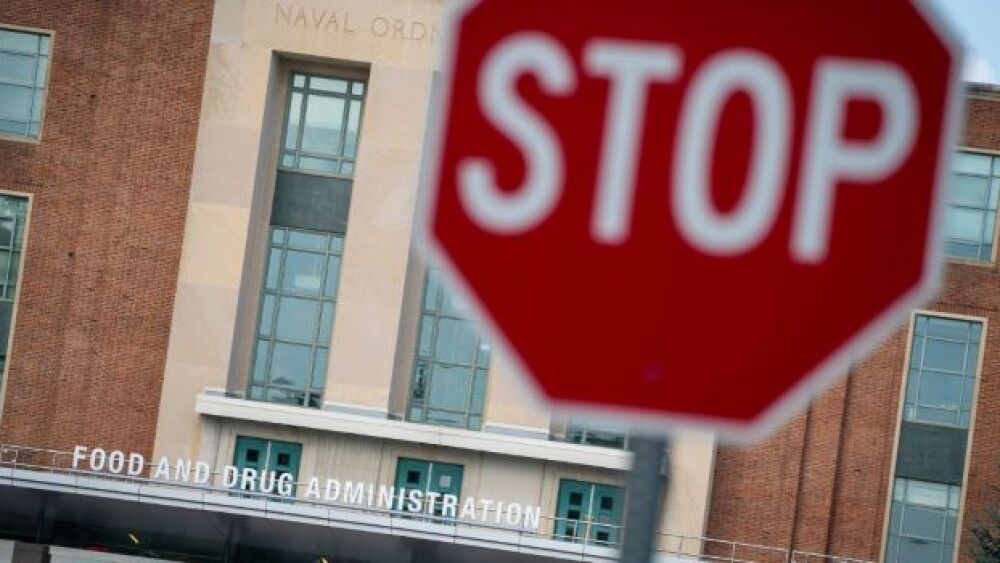BioCryst’s success of its Orladeyo launch in its Q1 report was overshadowed by the news that the FDA had placed a partial clinical hold on three of its clinical trials evaluating BCX9930
Sarah Silbiger/Getty Images
Although BioCryst probably wanted to tout the success of its Orladeyo launch in its first-quarter financial report, it was overshadowed by the news that the U.S. Food and Drug Administration had placed a partial clinical hold on three of its clinical trials evaluating a development-stage asset, BCX9930.
On April 8, BioCryst, which is based in Research Triangle Park, N.C., announced it had paused enrollment in the REDEEM-1, REDEEM-2 and RENEW clinical trials of BCX9930 while it evaluated increased serum creatinine levels observed in some patients. Patients already enrolled were continuing. The drug is an oral Factor D inhibitor to treat complement-mediated diseases.
REDEEM-1 is evaluating the drug alone in PNH patients with inadequate response to a C5 inhibitor. REDEEM-2 is studying it alone in PNH patients not currently receiving complement inhibitor therapy. RENEW is evaluating the drug in patients with either C3 glomerulopathy (C3G), immunoglobulin A nephropathy (IgAN) or primary membranous nephropathy (PMN).
The company reported the FDA had placed a partial clinical hold, which means BioCryst cannot enroll new patients, although patients already enrolled who appear to be receiving clinical benefit from the treatment and who have no other options can continue to be dosed.
BioCryst has found that three patients with PNH (paroxysmal nocturnal hemoglobinuria) in the REDEEM trials who received BCX9930 had early-onset, and moderate or severe, elevations in serum creatinine after receiving 500 mg twice a day for several weeks. Two of the patients were taken off therapy, while one, who had the lowest serum creatinine increase, is continuing treatment. About one-third of patients receiving the drug in the REDEEM studies had early increases in serum creatinine. And about 40% of patients in the long-term extension of the proof-of-concept trial, after switching to a 500 mg twice-daily dose, had a slowly evolving, late-onset, mild to moderate serum creatinine increase. It wasn’t observed at lower doses.
“As we complete our investigation, we will continue to be comprehensive and deliberate, with a primary focus on patient safety,” said Dr. William Sheridan, M.D., BioCryst’s chief medical officer.
Otherwise, the focus was on Orladeyo (berotralstat), a once-daily therapy for the prevention of hereditary angioedema (HAE) attacks. The drug’s net revenue for the first quarter was $49.7 million. About half of patients currently on the drug have switched from another prophylactic treatment, half of which were on lanadelumab, Takeda’s Takhzyro.
“We are very pleased that strong patient demand continued to drive growth in the first quarter and overcome the traditional Q1 reimbursement headwinds,” said Charlie Gayer, BioCryst’s chief commercial officer. “With outstanding reimbursement in place, patients continuing to enjoy an excellent experience on Orladeyo and the expansion of both our new and existing prescriber bases, we expect steady growth throughout the remainder of 2022 as we achieve no less than $250 million in Orladeyo net revenues for the year.”
The drug has also been launched in Denmark, France, Germany, Japan, Norway, Sweden, the United Arab Emirates and the United Kingdom.
Total revenues for the quarter were $49.9 million, up from $19.1 million in the previous year. The quarter’s research and development expenses rose to $65.4 million from $42.4 million in the same period in 2021, primarily due to investment in its Factor D program, including BCX9930. Net loss for the quarter was $74.2 million, or $0.40 per share. The company reported as of March 31 that it has $446.8 million in cash, cash equivalents, restricted cash and investments. Cash spent on operations for the quarter was $71.0 million.
Investors, likely concerned about the clinical hold, weren’t enthused, with shares down 9% in premarket trading.
Jon Stonehouse, president and chief executive officer of BioCryst, stated, “We are now over a year into the Orladeyo launch and are excited to see strong and continuing patient demand and steady expansion in our prescriber base among both new and existing prescribers. These trends continued in the first quarter of 2022 and reinforce our confidence that we will achieve no less than $250 million in new Orladeyo revenue in 2022 and peak Orladeyo sales of $1 billion.”





